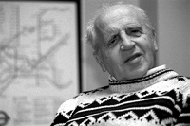
 It might not seem surprising that history professor Dr. Norman Coombs was voted New York State Professor of the year in 1990, has published a book on black history, and teaches classes to students at the Rochester Institute of Technology and internationally - until you learn that Dr. Coombs is blind. Cyberspace and computer voice synthesizers have broken the barriers of both space and his disability.
It might not seem surprising that history professor Dr. Norman Coombs was voted New York State Professor of the year in 1990, has published a book on black history, and teaches classes to students at the Rochester Institute of Technology and internationally - until you learn that Dr. Coombs is blind. Cyberspace and computer voice synthesizers have broken the barriers of both space and his disability.
Dr. Coombs' on-line workshops reach more than 500 students with and without disabilities in 21 different countries. All work is sent to him over the net, and his voice synthesizer translates it from text to speech at 450 words per minute.
 In the early 1980's, Dr. Coombs, along with several other educators, explored how computers could help students and academics with disabilities. Together they started Equal Access to Software Information, which offers discussion groups, newsletters, workshops, brochures and other support. E.A.S.I. has a strong presence on the Web through Dr. Coombs' home page at http://www.rit.edu/~nrcgsh, and works closely with other groups promoting adaptive computer technologies.
In the early 1980's, Dr. Coombs, along with several other educators, explored how computers could help students and academics with disabilities. Together they started Equal Access to Software Information, which offers discussion groups, newsletters, workshops, brochures and other support. E.A.S.I. has a strong presence on the Web through Dr. Coombs' home page at http://www.rit.edu/~nrcgsh, and works closely with other groups promoting adaptive computer technologies.
"The computer and Internet are two of the most liberating and empowering technologies ever to emerge for people with disabilities," says Dr. Coombs. And that liberating impact is a global one. Dr. Coombs finds that computers "offer the potential for changing the way people learn and work," and reduce status barriers between teachers and students. "This makes teachers more of a resource and less of experts delivering a finished package." Working fourteen hours a day in his spartan office, touch-typing replies over the Internet to students he cannot see and may never meet, Dr. Coombs has already become a resource to the whole world.
Dr. Coombs finds that computers "offer the potential for changing the way people learn and work," and reduce status barriers between teachers and students. "This makes teachers more of a resource and less of experts delivering a finished package." Working fourteen hours a day in his spartan office, touch-typing replies over the Internet to students he cannot see and may never meet, Dr. Coombs has already become a resource to the whole world.


 It might not seem surprising that history professor Dr. Norman Coombs was voted New York State Professor of the year in 1990, has published a book on black history, and teaches classes to students at the Rochester Institute of Technology and internationally - until you learn that Dr. Coombs is blind. Cyberspace and computer voice synthesizers have broken the barriers of both space and his disability.
It might not seem surprising that history professor Dr. Norman Coombs was voted New York State Professor of the year in 1990, has published a book on black history, and teaches classes to students at the Rochester Institute of Technology and internationally - until you learn that Dr. Coombs is blind. Cyberspace and computer voice synthesizers have broken the barriers of both space and his disability.  In the early 1980's, Dr. Coombs, along with several other educators, explored how computers could help students and academics with disabilities. Together they started Equal Access to Software Information, which offers discussion groups, newsletters, workshops, brochures and other support. E.A.S.I. has a strong presence on the Web through Dr. Coombs' home page at http://www.rit.edu/~nrcgsh, and works closely with other groups promoting adaptive computer technologies.
In the early 1980's, Dr. Coombs, along with several other educators, explored how computers could help students and academics with disabilities. Together they started Equal Access to Software Information, which offers discussion groups, newsletters, workshops, brochures and other support. E.A.S.I. has a strong presence on the Web through Dr. Coombs' home page at http://www.rit.edu/~nrcgsh, and works closely with other groups promoting adaptive computer technologies. Dr. Coombs finds that computers "offer the potential for changing the way people learn and work," and reduce status barriers between teachers and students. "This makes teachers more of a resource and less of experts delivering a finished package." Working fourteen hours a day in his spartan office, touch-typing replies over the Internet to students he cannot see and may never meet, Dr. Coombs has already become a resource to the whole world.
Dr. Coombs finds that computers "offer the potential for changing the way people learn and work," and reduce status barriers between teachers and students. "This makes teachers more of a resource and less of experts delivering a finished package." Working fourteen hours a day in his spartan office, touch-typing replies over the Internet to students he cannot see and may never meet, Dr. Coombs has already become a resource to the whole world.